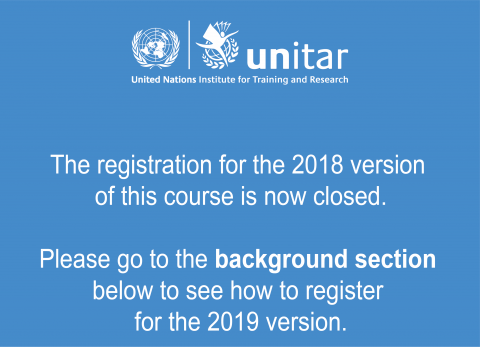
UNITAR Online Catalogue
Women, Leadership and Peacebuilding (ESS.2018.009)

Peace
Background
Disclaimer: To register for the 2019 version of this course, please click on the new link here: https://www.unitar.org/event/full-catalog/women-leadership-and-peacebuilding-ess2019009-0
Event Objectives
The role of women in peacebuilding is immense. The United Nations Security Council Resolutions (S/RES) 1325, 1888, 1889, 1820 and 2106 reaffirm the key role women can play in re-establishing the fabric of a recovering society and stresses the need for their involvement in the development and implementation of post-conflict strategies. Often only viewed as victims, women also play a key role in preventing violent conflict, resolving it, and rebuilding societies in post-conflict periods. Women can act as agents of change, active participants, supporting participants, victims and spoilers, and newly responsible care providers. They can play an active leadership role and positively impact peacebuilding and national development at all levels.
This course introduces the concept of gender as a lens for a more inclusive and nuanced understanding of the challenges faced by men and women in conflict environments. It enables the application of a gender lens to conflict and peace issues and the development of a gender-sensitive capacity-building and leadership approaches for the field. Through four modules, the course provides the conceptual and practical tools for better understanding the different roles that men and women play in peacetime and wartime; gendered impacts of conflict, war and insecurity; and the current work that women’s organisations do in post-conflict contexts to increase women’s leadership and decision-making power in order to transform leadership models, and contribute to peace and conflict resolution activities.
The course aims at making a concrete contribution by bringing together a diverse group of people to critically reflect on the involvement and challenges of women at all levels in peacebuilding and national development, and to think of ways to more effectively implement the United Nations Security Council Resolutions and other legal instruments directed at promoting women’s leadership and participation. Using various exercises, case studies, scenarios and videos, the course highlights the critical role of women in post-conflict reconstruction by specifically analysing the complex relationships between gender, leadership and peacebuilding.
Learning Objectives
At the end of the course participants should be able to:
- Outline women’s role and vulnerabilities in conflict and post-conflict settings;
- Assess critically women’s contribution to peacebuilding;
- Analyze strategies for enhancing representation of women in leadership positions;
- Design a strategy to foster women’s participation and inclusion in peacebuilding and leadership processes in a given context.
Content and Structure
This self-paced course is composed of four modules:
- Module 1: Women, Conflict and Insecurity
- Module 2: Women, Conflict Prevention and Peacebuilding
- Module 3: Women and Leadership
- Module 4: Mainstreaming Gender in Peacebuilding Processes
Methodology
The course is based on the synergy of theory and practice. Taking advantage of the opportunities of technology-enhanced learning, the learning materials are presented through various media, such as text, graphs, images and video material, which contribute to better retention and enhance the learning process.
In order to create collective knowledge and to facilitate interaction and experience sharing among participants, discussion forums are organized.
Targeted Audience
The course is open to anyone interested in the role of women in peacebuilding, including practitioners working in post-conflict contexts, field workers, and international volunteers. United Nations Volunteers, holding a valid contract, can benefit from a reimbursement from the UNV Programme. Students are entirely responsible for ensuring their eligibility and requesting their reimbursement directly with the UNV office.
Additional Information
Technical Requirements
UNITAR recommends the following as a minimum in hardware and software to take our e-Learning courses. Please consult your Network Administrator or Systems person to ensure that you have the following:
Platform:
- Windows XP, 7 or superior;
- MacOS 10.6 (Snow Leopard) or superior;
- Linux.
Hardware:
- Intel Core 2 Duo – or AMD – 3 GHz processor;
- 3 GB of RAM (4 GB recommended);
- Hard drive: 160 GB minimum.
Software:
- Adobe Acrobat Reader;
- Adobe Flash Player.
Browser:
- Google Chrome 30.0 or superior;
- Mozilla Firefox 25.0 or superior;
- Safari 7 or superior;
- Internet Explorer 8 or superior.
Note that JavaScript, Cookies and Popups must be enabled
Mobile:
- Apple iOS in Apple iOS 7 or superior on iPad:
- Articulate Mobile Player;
- Moodle Mobile.
- Android OS in Android OS 4.1 or superior (optimized for tablets):
- Articulate Mobile Player;
- Moodle Mobile.